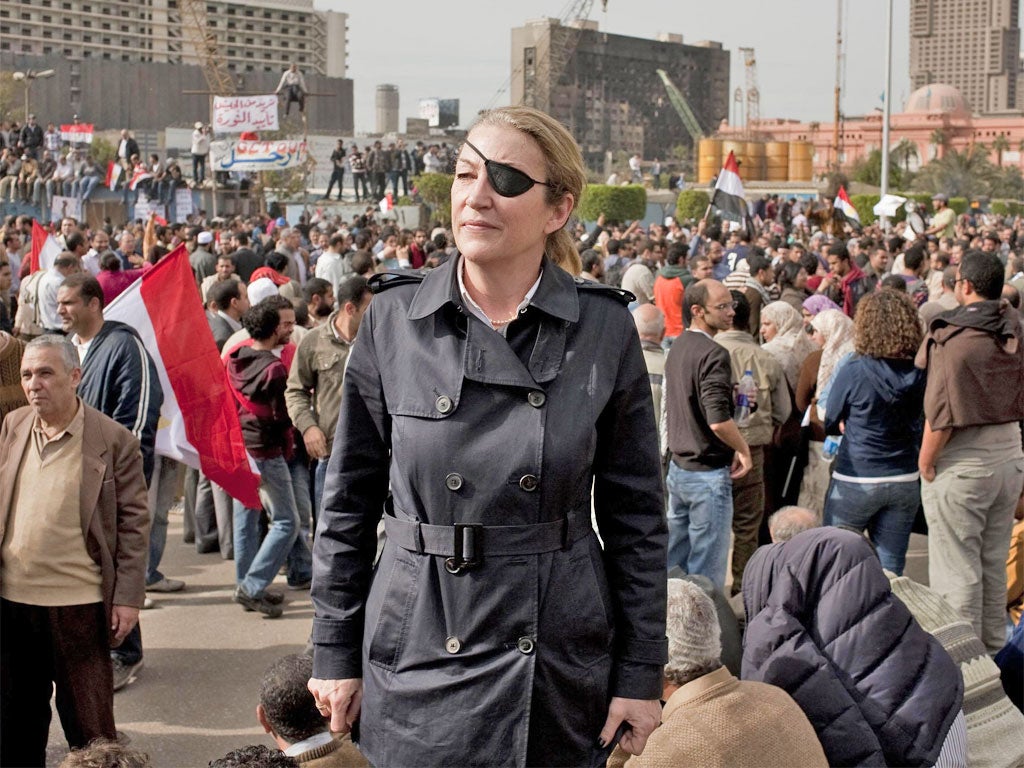'Marie deserved the truth': Assad regime deliberately targeted and killed journalist Colvin, investigation claims
Marie’s sister Cat Colvin tells The Independent: 'The case shows there was a well-planned effort to target journalists above everyone else in Syria: journalists, then the people leading rallies, then normal participants. It’s just horrifying'

The regime of Syrian president Bashar al Assad deliberately targeted a building used by journalists during the siege of Homs in 2012, resulting in the deaths of reporter Marie Colvin and photographer Remi Ochlik, according to a landmark legal case brought by the Colvin family.
A cache of evidence compiled over the six years since Ms Colvin's death has been presented in court, including video from her final moments, nearly 200 confidential military documents and testimony from a Syrian defector.
The investigation alleges that the Syrian government tracked the American journalist’s movements in order to silence her reporting on the civil war. The plaintiffs are suing the Syrian government for $300m and calling on the federal court in Washington DC to issue a public judgement against the Assad regime, condemning it for its alleged crimes.
Speaking to The Independent, Ms Colvin's sister Cat Colvin said the Center for Justice and Accountability (CJA) had put together “a really powerful package of evidence”. “It has been emotional to read it,” she said.
“The case shows there was a well-planned effort to target journalists above everyone else in Syria: journalists, then the people leading rallies, then normal participants. It’s just horrifying,” she said, adding: “Marie deserved the truth.”
Marie Colvin, a veteran foreign reporter for The Sunday Times, was on assignment with award-winning French photographer Remi Ochlik in February 2012, documenting the first major siege of the bloody war.
Rocket fire on the house they were staying in Homs’ Baba Amr neighbourhood killed them both and also injured British photographer Paul Conroy, French reporter Edith Bouvier and Syrian interpreter Wael al Omar. At least nine other civilians died in the bombardment.
The lawsuit included as evidence 10 eyewitness accounts of the attack as well as dozens of pages of Syrian intelligence and military documents and faxes which were smuggled out of the country by opposition activist group the Commission for International Justice and Accountability (CJA).
Inside Syria's obliterated ‘capital of the revolution’
Show all 10Lawyers for Ms Colvin’s family argue that an August 2011 fax, allegedly sent from Syria’s National Security Bureau, instructed security bodies to launch military and intelligence campaigns against “those who tarnish the image of Syria in foreign media and international organisations”.
Other documents showed that the Central Crisis Management Cell, a special war cabinet created by Assad to oversee the crackdown on the democratic opposition, had tracked Ms Colvin’s movements from Lebanon and over the border into Syria – evidence which the family's lawyers say showed she had been targeted for assassination by the highest levels of government.
The Syrian army’s Fourth Armoured Division, led by President Assad’s brother Maher, tracked Ms Colvin’s position by tracing her satellite phone signal and confirmed it through informants on the ground, according to the plaintiffs.
They allege that the house being used as a makeshift media centre to document the starvation and shelling of the siege of rebel-held Homs was then shelled by the Syrian Republican Guard and Special Forces working with a paramilitary death squad known as the shabiha.
President Assad has refused to acknowledge the US case. In his only public response in an interview in 2016 after the suit was filed, he said that Ms Colvin was responsible for her own death.
“It's a war and she came illegally to Syria, she worked with the terrorists and because she came illegally, she’s responsible for everything that befell her,” he said at the time.
Foreign governments are usually immune from US civil lawsuits, but there are exceptions for countries designated by the State Department as sponsors of terrorism, such as Syria.
The case, which is the first of its kind in the US brought against the Syrian government, should form a blueprint for other attempts at justice in Syria’s brutal war, said CJA attorney Scott Gilmore, who is representing Ms Colvin's family.
“This is a civil case seeking punitive and monetary damages of $300m, but that is not its primary goal – the primary goal is to establish a historical record of Syria’s horrors and galvanise and build support for other legal challenges around the world,” he told The Independent.
There are few avenues open for Syrians seeking justice against the alleged disappearances, torture and other crimes of the Syrian government. Last year, the head of the UN’s investigative panel into human rights abuses in the civil war resigned from her position because she was so frustrated with its inability to hold criminals to account.
Syrians make fuel from plastic waste
Show all 8“There are multiple criminal inquiries ongoing using the principles of universal jurisdiction. But in the absence of any functioning UN mechanisms for Syrian war crimes, seeking truth and justice is a very difficult challenge,” Mr Gilmore said.
“Our family feels great solidarity with the Syrian people,” Cat Colvin said.
“It’s so painful to think this tragedy is still ongoing and no one seems to care anymore. Witnesses risked their lives to get us this evidence. We are eternally grateful.
“Marie’s legacy is drawing attention to these issues. Her work and voice continue.”
Syria entered its eighth year of civil war last month. The complex conflict has killed more than 500,000 people and driven half of the pre-war population of 22 million from their homes.
Subscribe to Independent Premium to bookmark this article
Want to bookmark your favourite articles and stories to read or reference later? Start your Independent Premium subscription today.

Join our commenting forum
Join thought-provoking conversations, follow other Independent readers and see their replies